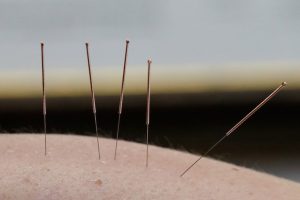ACUPUNCTURE & DRY NEEDLING
At Ranelagh Physiotherapy Clinic, our physiotherapists use Acupuncture and Dry Needling specifically for treating conditions such as pain and muscle injuries. Acupuncture is also used for nerve related issues such as Chronic Regional Pain Syndrome and Bell’s palsy, as well as headaches, poor sleeping patterns, and stomach upsets.
Acupuncture is a key component of Chinese medicine and has been used for over a thousand years. It involves the use of thin, disposable needles to stimulate the flow of energy or Chi throughout the body. In the West, it is used in conjunction with other treatments, principally to relieve pain, boost recovery and promote healing in musculoskeletal injuries. Acupuncture tries to balance the body's energy and biochemical balance by stimulating our natural healing abilities, thus promoting physical and emotional well-being. At Ranelagh Physiotherapy Clinic, we have highly trained staff in acupuncture who can add their expertise to help provide the best healing environment for your injury or condition.
[expand title="Read More..."]
Acupuncture adjusts the body’s energy and biochemical balance by stimulating the body’s natural healing abilities, thus promoting physical and emotional well-being.
As an accepted interventional modality with thousands of years’ experience behind it, acupuncture is now accredited by modern medicine as a useful adjunct to health and human bodily performance. Acupuncture is based on Traditional Chinese Medicine (TCM) principles of the flow of energy, or Chi, through specific pathways in the body. Pain or dysfunction is believed to occur if there is a block or obstruction of the flow of energy. Treatment is to restore free-flowing Chi and therefore restore normal pain-free function by stimulating specific acupuncture points throughout the body.
Research supports the use of Acupuncture for pain relief.
[/expand]
Dry Needling
Dry needling is an effective treatment technique that involves the use of very fine acupuncture needles to deactivate trigger points. Treatment involves insertion of a needle into the muscle, creating a ‘twitch’ sensation, and releasing tension. It is usually necessary to treat many different trigger points to obtain the best results. Post treatment, there is a release of muscle spasm and improvement in muscular function.
[expand title="Read More..."]
A trigger point is a tight, irritable area of muscle that, when palpated, causes local or radiation of pain. Patients often describe them as a ‘knot’ in the muscle. They generally develop over time due to an overload of a muscle, often related to exercise, posture or biomechanics.
While dry needling is not the only way to treat a trigger point, it is a very effective treatment as it is able to focus on discrete points in the muscle and treat deeper areas of muscle without affecting other surrounding muscles. It can also be used to normalise muscle function if a muscle is not working as it should. Physiotherapists use dry needling in conjunction with other physiotherapy techniques to achieve the best outcome for patients.
The needles used are very fine and cause very minimal tissue damage when inserted. Patients will often experience some pain with the muscular twitch response to stimulation. Post treatment, there may be localised tenderness and muscular fatigue, which patients will find similar to post exercise muscle stiffness and fatigue usually experienced after a heavy exercise session. This should ease over a day or two and your physiotherapist can best advise how to deal with this. The needles used are sterile and discarded after use.
The physiotherapists who utilise dry needling at Ranelagh Physiotherapy Clinic have all completed further training in this technique. Dry needling is an invasive technique where the needle penetrates the skin, so accurate anatomical knowledge, such as that gained in the 4-year physiotherapy degree, is vital to ensure safety.
This information is provided to give general information on Dry Needling. If you have further questions it is best to discuss this with your physiotherapist.[/expand]
Address
15A Dunville Avenue.
Ranelagh, Dublin 6
D06 F5T7
Phone
01 - 496 5820
Opening Hours
Monday: 8am - 8pm
Tuesday: 8am - 8pm
Wednesday: 8am - 8pm
Thursday: 8am - 8pm
Friday: 8am - 6pm
* Reception: 9am to 5pm


